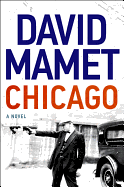
Crackling with colorful, truncated street dialogue, David Mamet's historical novel Chicago exhibits the kind of talk-talk drama that earned his plays (Glengarry Glen Ross, Speed-the-Plow) a Pulitzer Prize and Tony nominations and his film screenplays (The Verdict, Wag the Dog) a couple Oscar nominations. Set in the rough and tumble city of Mamet's youth, Chicago is the story of Mike Hodges, a hungry young Tribune reporter working the city desk in the 1920s. Capone and the Italian Outfit ran the South Side; O'Banion and the Irish mob ruled the North. When his Irish girlfriend is murdered during a tryst in his barebones flat, the guilt-ridden Hodges tenaciously pursues her killer. His snooping leads up and down the shores of Lake Michigan, through the Windy City's speakeasies and whorehouses, and into cop bars and bootlegger supper clubs--ultimately uncovering an elaborate scheme to swipe guns to sell to the Irish Republican Army.
A dialogue-driven crime novel, Chicago does for Mamet's historical hometown what George V. Higgins did for Boston. Gangsters sling derogatory ethnic epithets at their fellow immigrants. Peekaboo, the see-everything, know-everything Madame, disdains her clients and chastens her girls. Hodges and his colleagues are a cynical tribe. His editor muzzles his idealism: "News is that which makes its consumer self-important, angry, or sufficiently whatever the hell to turn to page twelve, and turning, encounter the ad for the carpet sale." With Chicago, Mamet's playing another winning hand. --Bruce Jacobs, founding partner, Watermark Books & Cafe, Wichita, Kan.

